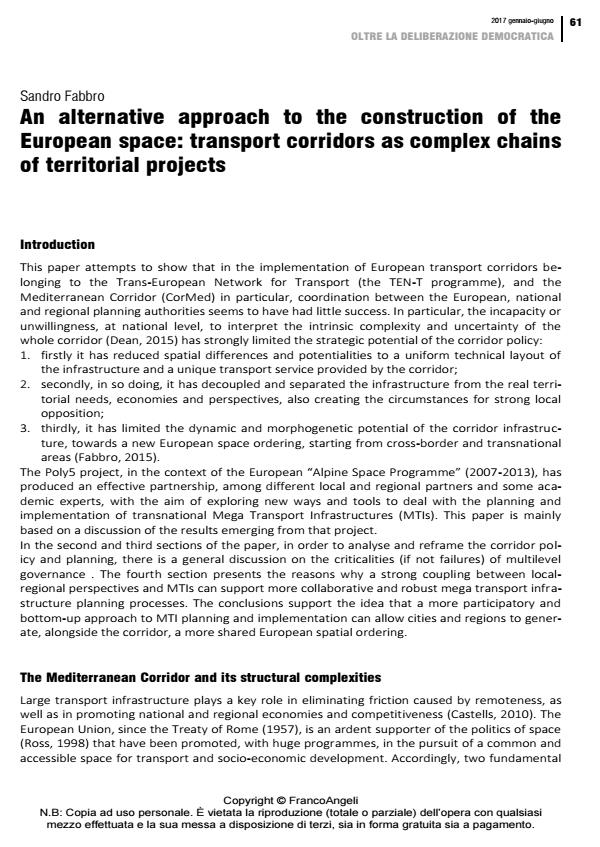An alternative approach to the construction of the European space: transport corridors as complex chains of territorial projects
Titolo Rivista CRIOS
Autori/Curatori Sandro Fabbro
Anno di pubblicazione 2017 Fascicolo 2017/13
Lingua Inglese Numero pagine 11 P. 61-71 Dimensione file 1122 KB
DOI 10.3280/CRIOS2017-013005
Il DOI è il codice a barre della proprietà intellettuale: per saperne di più
clicca qui
Qui sotto puoi vedere in anteprima la prima pagina di questo articolo.
Se questo articolo ti interessa, lo puoi acquistare (e scaricare in formato pdf) seguendo le facili indicazioni per acquistare il download credit. Acquista Download Credits per scaricare questo Articolo in formato PDF

FrancoAngeli è membro della Publishers International Linking Association, Inc (PILA)associazione indipendente e non profit per facilitare (attraverso i servizi tecnologici implementati da CrossRef.org) l’accesso degli studiosi ai contenuti digitali nelle pubblicazioni professionali e scientifiche
- Ballarin A., Bianchini M., Di Piazza F. & Lioce R. (2015). Integrating Mega Transport Infrastructures with the complex territories of the Veneto Region-A weighted programmatic approach. In: Fabbro S. (Ed.), Mega Transport Infrastructure Planning. European Corridors in Local-Regional Perspective, Heidelberg, New York, Dordrecht, London: Springer International Publishing.
- Barnéoud B. (2015), The “Démarche Grand Chanter” in France. How to reduce the impacts of Mega Transport Infrastructure projects and enhance territorial development. In: Fabbro S. (Ed.), Mega Transport Infrastructure Planning. European Corridors in Local-Regional Perspective, Heidelberg, New York, Dordrecht, London: Springer International Publishing.
- Brunet R. (2002), Les lignes de l'espace européen de forces, Mappemonde.
- Castells M. (2010), The Rise of the Network Society, Oxford: Blackwell.
- Dean M. (2015), The need for a turning point in megaprojects planning and appraisal practices-the case of the Italian section of the Mediterranean corridor. In: Fabbro S. (Ed.), Mega Transport Infrastructure Planning. European Corridors in Local-Regional Perspective, Heidelberg, New York, Dordrecht, London: Springer International Publishing.
- Dillinger T., Fabbro S. & Thirstein A. (2014), Towards 2020. How to optimize Mega Transport Infrastructure (MTI) implementation on local and regional level. Lessons learned from transnational cooperation. Paper presented at the Poly5 Final Conference, Vienna University of Technology, 23-06-2014. --http://www.poly5.eu
- EC - European Commission (2007). Territorial Agenda of the EU. Towards a more competitive and sustainable Europe of diverse regions. Brussels.
- EC - European Commission (2011). Connecting Europe: The new EU core transport network. Brussels.
- EC - European Commission (2011). Territorial Agenda of the European Union 2020. Brussels.
- ESDP (1999). European Spatial Development Per-spective: Towards Balanced and Sustainable Development of the Territory of the EU, Office for Official Publication of the European Communities. Brussels.
- EU INEA (2013). Map of the new core transport network. --Retrieved from: http://ec.europa.eu/transport/themes/infrastructure/doc/ten-t-country-fiches/ten-t-corridor-map-2013.pdf.
- Fabbro S. (2015). Mega Transport Infrastructure Planning. European Corridors in Local-Regional Perspective. Heidelberg, New York, Dordrecht, London: Springer International Publishing.
- Fabbro S., Brunello L. & Dean, M. (2014). Reframing large transport infrastructure plans: a study on European corridors with a focus on North-Eastern Italy. International Planning Studies, Vol.20, No. 4, 323-349.
- Fabbro S. & Mesolella A. (2010). Multilevel spatial visions and territorial cohesion. Italian regional planning between the TEN-T corridors, ESDP polycentrism and governmental “Strategic Platforms”, Planning Practice and Research 1360-0583, 25(1).
- Faludi A. (2012). Multi-level (territorial) governance. Three criticisms. Planning Theory & Practice, Vol. 13, No. 2. 197-211.
- Faludi A. & Waterhout B. (2002). The Making of the European Spatial Development Perspective: No Masterplan (RTPI Library Series). London and New York: Routledge.
- Flyvbjerg B., Bruzelius N. & Rothengatter W. (2003). Megaprojects and Risk – An Anatomy of Ambition. Cambridge: Cambridge University Press.
- Gabrielcig F. & Turk M. (2015). Mega Transport Infrastructure projects as an opportunity for local cohesion. In: Fabbro S. (Ed.), Mega Transport Infrastructure Planning. European Corridors in Local-Regional Perspective. Heidelberg, New York, Dordrecht, London: Springer International Publishing.
- Kunzmann K. & Wegener M. (1991). The pattern of Urbanisation in Western Europe 1960-1990. Berichte aus dem Institut für Raumplanung, n. 28, Dortmund: Institut für Raumplanung, Universitët Dortmund.
- Marengo G., Nilsson S., & Picco P. (2015). The “territorialization” of Mega Transport Infrastructure projects-the results achieved by the Turin–Lyon Technical Observatory. In: Fabbro S. (Ed.), Mega Transport Infrastructure Planning. European Corridors in Local-Regional Perspective, Heidelberg, New York, Dordrecht, London: Springer International Publishing.
- Ross F. L. (1998). Linking Europe: Transport Policies and Politics in the European Union. Westport: Praeger Publisher.
- Salet W., Bertolini L. & Giezen M. (2013). Complexity and uncertainty: Problem or asset in decision making of Mega Infrastructure projects? International Journal of Urban and Regional Research, Vol.37, No. 6, 1984-2000.
- Salzmann A. (2013). Visioneering: Planning tool with the phenomenological approach. In: Tracking the Ljubljana Urban Region. International Student Workshop, 57-59.
- Schmitt P. & Van Well L. (Ed.) (2016). Territorial Governance across Europe. London and New York: Routledge.
- Schön D.A. & Rein M. (1994). Frame reflection: toward the resolution of intractable policy controversies. New York: Basic books.
- Schuschnig H. (2015). The Baltic-Adriatic corridor and its economic importance for the interested regions. In: Fabbro S. (Ed.), Mega Transport Infrastructure Planning. European Corridors in Local-Regional Perspective, Heidelberg, New York, Dordrecht, London: Springer International Publishing.
- Zech S. & Andreotta C. (2015). Preparing the future: Visioneering in the planning process of Mega Transport Infrastructure. In: Fabbro S. (Ed.), Mega Transport Infrastructure Planning. European Corridors in Local-Regional Perspective, Heidelberg, New York, Dordrecht, London: Springer International Publishing.
- New Metropolitan Perspectives Sandro Fabbro, pp.2757 (ISBN:978-3-031-06824-9)
Sandro Fabbro, An alternative approach to the construction of the European space: transport corridors as complex chains of territorial projects in "CRIOS" 13/2017, pp 61-71, DOI: 10.3280/CRIOS2017-013005